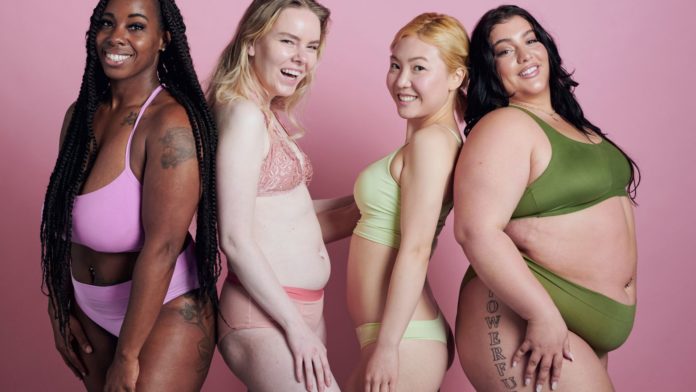As a millenial invested in the fine art of self-care, one of the moves I’ve cultivated over the years is setting boundaries. Really, if you haven’t attempted to set some healthy, clearly-defined boundaries, I highly recommend it — especially with family. Hispanic families have a special way of getting all up in your business. With that, and all of my carefully-placed boundaries, I know that I can’t set foot in a familial setting without immediately hearing ¿No quisiste arreglarte la cara?
Or ¡Hay ques flaca te vez!
Or ¿Cuando te vaz ha pienar el pelo?
In our society, you would think that being seen as flaca would be a good thing. But somehow, you always end up asking yourself, “Didn’t I look this way last time we saw each other? Why is this worth commenting on?” Perhaps it isn’t setting boundaries that will bring more peace into a latinx home, but managing expectations.
What it Means to Represent Body Image On-screen
I was having PTSD flashbacks about the aforementioned appraisals as I watched Dumplin’, a Netflix adaptation of the Julie Murphy novel by the same name. Jennifer Aniston and Danielle Macdonald star opposite each other as an unlikely mother-daughter duo. Aniston’s Rosie is a former beauty queen and single mother who directs the very same pageant she won in 1991. Macdonald’s Willowdean, or Will, is a rebellious and inherent leader who hopes to subvert beauty standards by entering the pageant. In the introduction to Rosie, we see her throw her hands up in frustration and suggest her daughter run a brush through her hair (what is it about natural, air-dried hair that drives our mothers people crazy?). The pair even recite a familiar quip, “A well-styled head of hair is a head above the rest.” The pageant serves as a convenient, dare-I-say Hallmark-esque, vehicle for a confrontation of beauty standards and body image in the film. It’s even Macdonald’s anti-beauty queen who ends up with the coveted cool guy in the end.
[advanced_iframe src=”<iframe width=”560″ height=”315″ src=”https://www.youtube.com/embed/k86KDFh_q6E” frameborder=”0″ allow=”accelerometer; autoplay; encrypted-media; gyroscope; picture-in-picture” allowfullscreen></iframe>” width=”100%” height=”600″]
What’s important to keep in mind as long as we’re managing expectations is how perspectives become popular. We can also think about this as the way norms are established. One way to fast-track a trend is to incorporate it in media. Deanna Sellnow writes in The Rhetorical Power of Popular Culture that mediated popular culture communicates to and for us regarding what we should believe and how we ought to behave. This communication persuades us by empowering and disempowering certain people, certain kinds of people, and certain groups by circulating messages about what is desirable or not, appropriate or not, normal or not.
Dumplin’ doesn’t just hit home because it makes a few references to unkempt hair as rebellion. The film touches on many ways that our own body image influences the way we perceive our relationships and interactions with others. One moment that reflects the nuances of body positivity occured between Will and her best friend, Ellen (played by Odeya Rush). Ellen seems to meet typical beauty standards effortlessly, a juxtaposition that the characters are forced to reckon with in the film. The moment I’m drawing on takes place while the girls gush over the details of Will’s first kiss with her crush, Bo, which “did not end well,” according to Will. She shares that she couldn’t let herself enjoy the moment with Bo because he touched that spot on her lower back that she feels particularly insecure about — cue the rabbit hole of hyper-criticism that could kill any mood. Ellen sympathizes with her best friend that she too cannot accept herself when her boyfriend grazes a spot of acne during a moment of intimacy. While their insecurities differ, the girls understand that they are both experiencing a loss of true presence and enjoyment.
I appreciate the choice to acknowledge different kinds of body image, despite the way the characters fit into beauty standards. The moment of reckoning that I alluded to earlier occurs when Will tells Ellen that she “isn’t built for the revolution.” Willowdean’s confession leads Ellen to share that she personally has never thought of Willowdean as fat, which makes Willowdean realize that she was not being an unconditional friend and was judging Ellen’s capabilities on her mainstream attractiveness.
It becomes clear that Willowdean couldn’t possibly have expected her best friend not to notice the discrepancies between their forms because it has been such a constant truth in her own mind. This truth comes as impossible to deny when Will tells Bo that he couldn’t possibly want to be with a girl like her, a belief shaped by mainstream beauty standards that have repeatedly told her that she isn’t worthy of love and happiness.
The confrontation of body image throughout the film isn’t just about Willowdean’s weight. Body positivity takes on a total-body approach when the viewers are left considering Will’s Aunt Lucy’s confidence, the way her mother has sacrificed all her relationships for beauty, Ellen’s absolute support, Millicent’s self-love, and Hannah’s passion for social justice. The film invites viewers to consider how to be more generous with ourselves and the people around us.
The film invites viewers to consider how to be more generous with ourselves and the people around us.
Dumplin’ isn’t the only product of Hollywood that brings body positivity to the forefront and subvert expectations. Pitch Perfect, Hairspray, Little Miss Sunshine, Real Women Have Curves (a Latinx story), Patti Cake$ (also starring Danielle Macdonald), and Shrill (a Hulu original series) have been paving the way for entertainment that brings diverse bodies to the silver and small screens. This move to represent bodies that hadn’t previously made the cut for the glitz and glamour of Hollywood is communicating new kinds of messages about what we should believe and how we ought to behave.
[advanced_iframe src=”<iframe width=”560″ height=”315″ src=”https://www.youtube.com/embed/ygp2XZXeYSE” frameborder=”0″ allow=”accelerometer; autoplay; encrypted-media; gyroscope; picture-in-picture” allowfullscreen></iframe>” width=”100%” height=”600″]
In the cases of Dumplin’, we’re invited to believe that women don’t need to use sex to be powerful, that beauty does in fact come in size 4 AND size 14, that our small-town stories and worth telling, and, most of all, that we are loved exactly the way we are. Maybe it’s not about managing expectations of others that will bring us peace in 2019 and beyond, but the expectations we have for ourselves. Like Will, if we have enough passion to pull up our own seat to the table, anything is possible.
Where Does Body Positivity Go From Here?
I don’t want to seem disillusioned, as if I believe Hollywood has become a sanctuary for women and diverse representations of personhood (even if some of the baggage has been cleared out by the #metoo movement). Body image responds to an ever-changing standard; “acceptable” bodies are defined by socio-historical and cultural norms. However, “acceptable” female bodies are largely identified as such by the male gaze. This patriarchal view on feminine value is based on the idea that women are valuable to society when they have a sexually desirable figure (this standard varies depending on decade), are young, have no visible or reproductive disabilities, are biologically female, and are ladylike.
Seeing as men have been holding most positions of power since before we became bi-peds, we can expect that the male gaze will be an influential aspect of popular perspectives. Afterall, there is a large population of women in Hollywood that are actively looking for means to conform to patriarchal beauty standards. Beyond Hollywood, there is now an actual career with the objective of persuading consumers that they need treatments, supplements, diets, memberships, and other beauty products to become beautiful. Influencers are heavily capitalizing on the obsession with attaining Western beauty standards, at the expense of vulnerable followers that have already been convinced that they are not good enough.
Jameela Jamil is among Hollywood’s newcomers who is speaking out for body positivity. In interviews and social media, she has called out influencers in addition to Hollywood moguls such as the Kardashians and Cardi B for peddling laxative tea (advertised as Fat Tummy Tea). Jamil argues that the posts are an unethical use of their platforms for many reasons including that the product has not been FDA approved and has an impact on bodily health. She launched an instagram account called “i_weigh” that encourages women to weigh themselves based the parts of their lives not defined by their bodies.
I’m turning “I Weigh” into a company, and one of our main goals is to work towards a policy change that means this way of talking about people’s bodies is considered hate speech. Fat-phobia is real, it is pervasive and prevalent and is damaging the mental health of millions. https://t.co/57s2f3rlJF
— Jameela Jamil (@jameelajamil) January 2, 2019
Her first post reads: “I weigh: Lovely relationship. Great friends. I laugh every day. I love my job. I make an honest living. I’m financially independent. I speak out for women’s rights. I like my bingo wings. I like myself in spite of EVERYTHING I’ve been taught by the media to hate myself about.” The perspective of the male gaze influences virtually every person who consumes media, which reproduces inescapable, socially-ingrained norms of peoples, populations, and humanity.
Unfortunately, both men and women are guilty of perpetuating the idea that women are objects in a male-subject world; this truth is why messages such as the body positivity charged throughout Dumplin’ and Jamil’s “i_weigh” campaign, among others, need to be circulated. To quote Gloria Steinem, “The first problem for all of us, men and women, is not to learn, but to unlearn.” I suspect that, eventually, body-positive entertainment will be part of our shared norm and we will be persuaded to communicate in more inclusive and accepting ways with others and with ourselves. However, in the vain of managing my own expectations, I will always expect my family to tap dance all over my beloved boundaries.
Sellnow, D. (2014). The rhetorical power of pop culture. Thousand Oaks, California: SAGE Publications.
For Image credit or remove please email for immediate removal - info@belatina.com



































